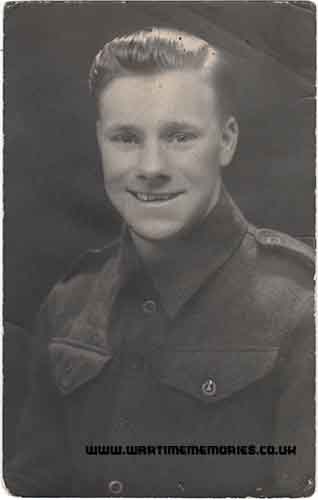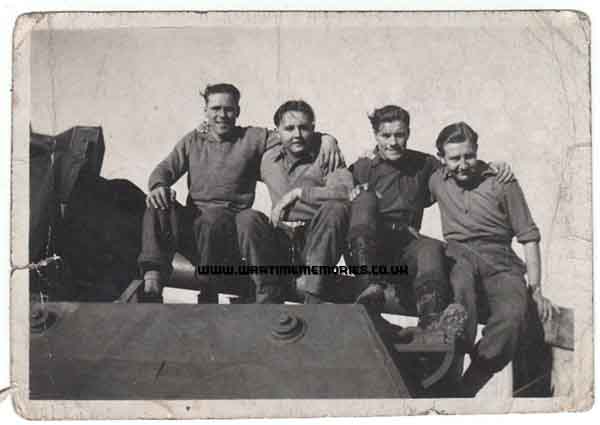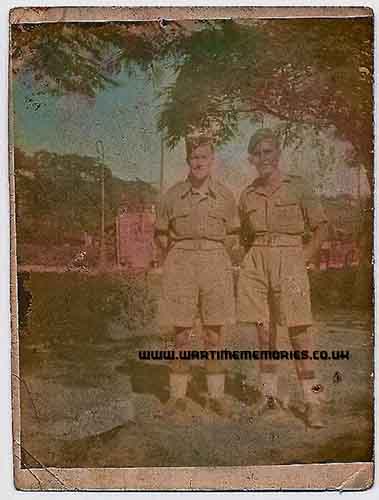Pte. Eric Bert "Bub" Shimmons
British Army Middlesex Regiment
from:Nacton Road, Ipswich
Written by Eric Bert Shimmons in 1993
My Army Career 1941 – 1946
In September 1941, at the age of 18, I joined the army, and was sent to Bury-St-Edmonds for six weeks of basic training. Once training was completed, my new mates and I we were sent to Chester where we joined the Middlesex Regiment to begin our Infantry training. After four months of extremely tough training, we were sent to the Island of Anglesea in North Wales where we joined the 51st Highland Division.
It was at Anglesea that we started our beach landing exercises. If we thought Chester training was rough, Anglesea was murder. We continued with the beach landings’ training until May 1942, and then it was called off. Our life, then, consisted of just route marches, rifle drills, and range shooting. At weekends it was fun because we had exercises with the local home guard and, 9 times out of 10, we all finished up in the local pub.
In January 1944 the beach landing exercises were resumed; however, this time it was much harder. Live ammunition was fired over our heads, and landed in the water about 20 yards behind us. These exercises continued until the night of June 1st 1944 when the Sergeant came into our hut and said, “Be ready to move at 8:30 tomorrow morning.” Anxious to know where we were going, the Sergeant would only say, “You’ll find out.”
The following morning at 8:30 promptly, we boarded our transports and headed south. After a few hours, we guessed we were going to Portsmouth. We were right. As soon as we arrived, around 6:00 that night, we went straight to a transit tent-camp not far from Portsmouth Docks, where we were assigned 12 men to a tent. After we got into our tent, the Sergeant came in and announced, “No-one is to leave camp, no letters to be written home, and no telephones to be used!” To top it all, one lad came back from a walk around the camp in disbelief and said, “Blimey, they’ve got Red Caps (Military Police) on all gates!” We felt like jailed prisoners, and spent the next 4 days doing nothing but playing cards and sleeping.
On the 4th day, around 9:00pm, the Sergeant poked his head into our tent and shouted, “OK lads, be ready to move in one hour!” Excitement and anticipation rippled through all of us, but we still didn’t know where we were going: “You’ll soon find out!” was all the Sergeant would say. But when questioned about dress code, the Sergeant’s words sent shockwaves through each of us: “Full Battle Order,” he announced. Those three words said it all; we knew something big was happening.
As instructed, we were all lined up outside the tent at 10:00 that night. The Sergeant marched us to the armory tents, and we were ordered to draw 100 rounds of ammunition and 2 grenades. We, then, marched about 1 mile to Portsmouth Docks. When we arrived, we noticed there were thousands of troops of all nationalities: American, French, and many others. Our officer told us we would be there for a few hours, so we just took it easy. Shortly after midnight our Officer stopped by and said, “OK lads, we’re moving out!” We marched, further, along the docks and boarded a big cargo boat called “The Lady of Man.” We set sail about 2:30 in the morning and, after several stops, entered the Channel just before daybreak.
Just after daybreak, between 4:30 and 5:00am, we looked around us and, to our amazement, saw an unbelievable sight that has stayed with me all my life. There were thousands of ships of all sizes, including Royal Navy ships. After looking over the Port side of our ship, we found we were very close to that great battleship “Warspite.” It was then, our C.O. came on deck and spoke: “Gather round lads. Well I guess you’ve probably figured out what’s going on. Yes, we are going to make a landing in Normandy, France. The first wave will go in at 6:00am, but we will go in at approximately 7:30am. The plan is for the 3rd British Infantry Division to land at 6:00am, and form a bridgehead about a mile deep. After we land at 7:30am, we will go through the 3rd Division and make straight for Caen. We are to take all of the high ground near Caen, and capture the city itself by nightfall. Intelligence reports state we should meet little opposition. Caen is 10 miles from where we will land. Good luck lads, see you soon.” The padre came and held a small service.
After that, we all sat on the ship’s deck, and hardly a word was spoken; we were each lost in our own thoughts. I know that I wondered if we would still be here tomorrow.
At approximately 5:30am, our thoughts were shattered when the Warspite opened fire with her big fifteen-inch guns; the noise was deafening. It was then that hundreds of Air Force bombers came over. We could see the French coast, and saw many shells and bombs exploding on the beach; we all thought that nobody could, possibly, have lived through that lot.
It was just after 6:00am when the 3rd British Division started landing. To our surprise, there was very little firing coming from the Germans; we thought just the job, they’re all dead. Another ship drew along side us, which carried the south Lancashire Regiment. We where landing with the South Lancs!
At 7:25am, we left our ship, and got into our landing craft. Several other landing crafts (Bren Gun Carriers) held our transports. We had to go about ½ mile to the beach. Jerry must have woken up, and started to throw everything at us. As I looked to my right, I saw two landing craft, belonging to the South Lancs. get hit. We landed on the beach, and rushed to wherever we could find shelter. The 3rd Division, which had landed before us, was firing to keep Jerries’ heads down so that our Bren Gun Carriers could land.
When our Carriers arrived, we jumped aboard and went straight through the 3rd Division Line heading for Caen. We got within 5 miles of Caen and managed to take all of the high ground. Up until then, we had not fired our rifles; however, the Brens had been busy. As they say in the Infantry, we hadn’t fired our rifles in anger.
When we took the last of the high ground referred to as Hill 112, we were coming under very heavy shell and mortar fire. The order was given to dig in which meant we had to dig into our foxholes. In slang words, we called them “Dofor’s” meaning, they would “do for” when you got killed because your body was just slung in.
After we dug in, we could see Jerry down below forming up with some tanks. They came at us in strength and large numbers. We, still, didn’t have any tanks; they had not landed. The officer shouted, “We must hold the Hill until tank support can come!” It was then we knew we would be firing our rifles for the first time in anger. As Jerry approached the bottom of our hill, our Bren guns, heavy machine guns, and mortars all opened up. We had to pick special targets and fire when the chance came. My mate in the same foxhole as me yelled, “I’ve got one!” By now, the riflemen were all firing. I remember getting a Jerry in my rifle sights and pulling the trigger; he jumped into the air and down he went.
It was a very strange thing - there was no excitement about it at all. I believed we were all the same. Ever since we joined an Infantry Regiment, we knew one day it would come to this. We had all thought about how we would react to this moment. You were so close to death that you didn’t think about it.
After about ½ hour, Jerry stopped where he was and dug in. Throughout the rest of the day and the next day, we were just taking pot shots at each other. As soon as anything moved, you shot at it. We were certain Jerry had taken heavy losses. We were waiting for reinforcements before starting again, and praying our tanks would come before his; however, we found out later, he never had any reinforcements. The Germans were still very strong in front of us. Although our armored divisions arrived after the 3rd day, they still wouldn’t give in. We should have taken Caen on the first day we landed, but it was 3 weeks later when we, eventually, took Caen.
The devastation of Caen was awful. When we first entered the outskirts of Caen, there seemed to be nothing standing above knee high, and the smell was awful. The dead littered the streets, and the sight was heart breaking. Men, women, and children all dead in the ruins, made us nearly sick. Caen was the one and only really big battle of World War II, but there were many smaller ones.
After taking Caen we broke through the German front and raced through Belgium and Holland. We came across small pockets of Germans trying to hold out, but they were, soon, dealt with. When we reached Eindhoven on the German Dutch border, we captured the bridge before the Germans blew it up, but Jerry tried all sorts of tricks to destroy it. One trick he tried was filling dead cattle with explosives and sending them down the river hoping they would explode on impact with the bridge, but our orders were to shoot at anything floating down the river.
When we crossed the German border, we where given strict orders not to talk or smile at the German people (fraternization order). As we marched through the village, I well remember the faces of the first German civilians we saw, it was a look of utter despair and fright. They had been told we would rape and shoot them on sight. Curiosity overcame fear when some young lads couldn’t resist coming up to us to look at our weapons; the ice was broken. Without being seen, we passed them bars of chocolate.
When we reached the River Rhine, we had to dig in on the banks and await our landing craft. It occurred to us that once we crossed, we would be in the heart of Germany. The night before crossing, our guns opened up to one of the biggest barrages, ever: “Operation Pepper Pot.” As we were getting into the landing craft, we could see shells exploding on the beach making it impossible for any living thing to survive. Bombers littered the sky, some pulling gliders. We counted six bombers and gliders shot down that night; some crashed very close to us but there was nothing we could do. When we landed on the German side of the river, they started to fire at us with mortars. I lost a very good friend during that attack. We had been together since our first training days at Chester and had, often, spoken about whether our luck would hold out. His never did.
After we crossed the Rhine, we made straight for Hamburg in order to take it. Since Jerry refused to surrender, Montgomery drew us back two miles and sent in the Air Force. We were positioned on high ground and had an astonishing view of the entire bombing. What a show! The Air Force bombed the Germans all night long.
We entered Hamburg at 8:30 next morning. Not a shot was fired. The devastation was unbelievable; fires were raging everywhere. There must have been thousands of dead under the rubble. We went straight through Hamburg, and stopped in a small village where we stayed for a week, then we heard the news: The war was over! I can remember that day very well because there was no shouting or cheering; it was just a very quiet day. It wasn’t until nighttime as we sat talking with our mates; we realized we had come through it. We had survived.


